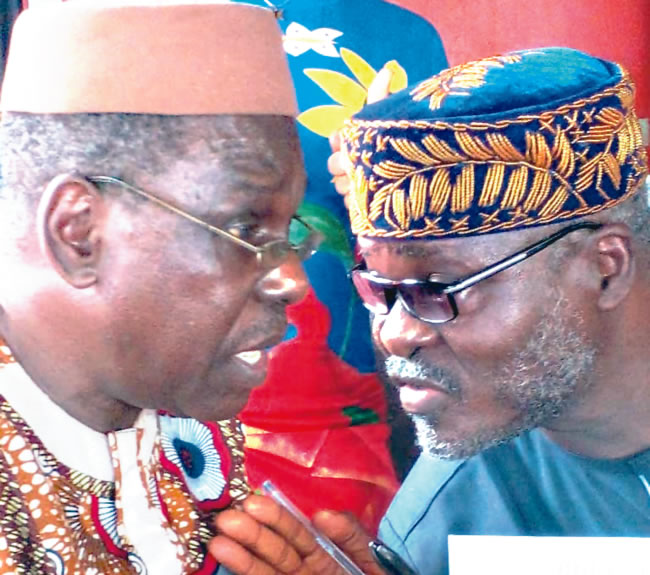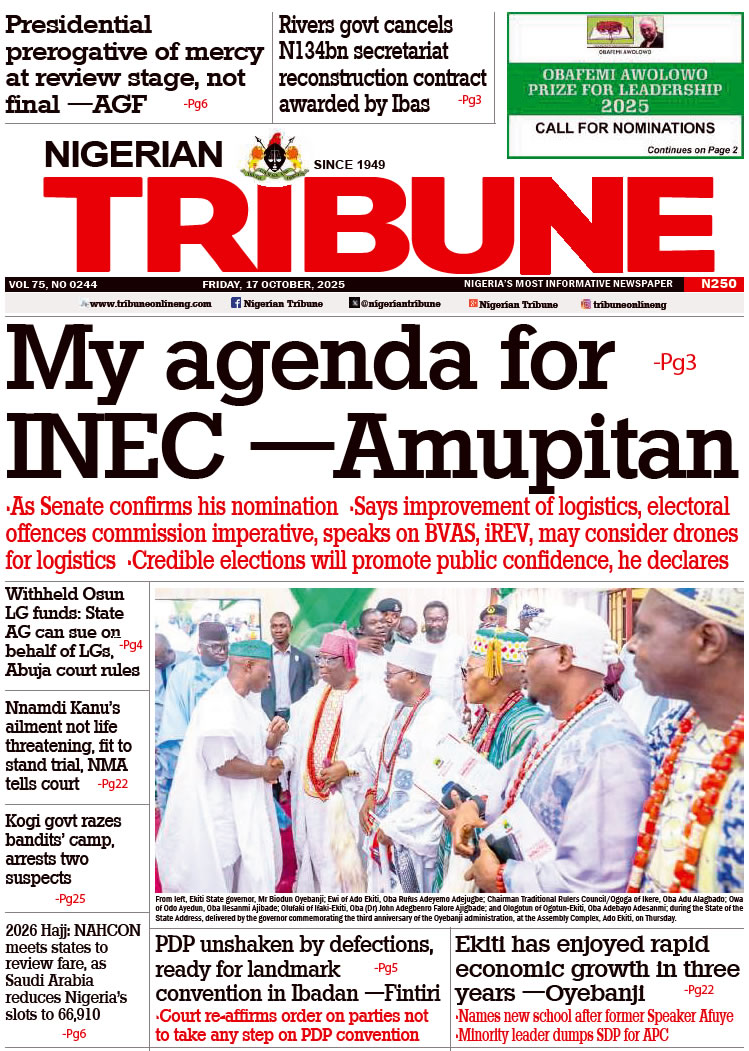Popularising solo plays across the country has received a boost with the publication of an anthology, by Greg Mbajiorgu which features works by some of Nigeria’s leading playwrights.
ON Tuesday, October 10, the academic, playwright and actor Greg Mbajiorgu continued his efforts to further mainstream solo drama performances with the unveiling of ‘The Power of One: Anthology of Nigerian Solo Plays’ he edited.
Mbajiorgu, who teaches at the Department of Theatre and Film Studies, University of Nigeria, Nsukka (UNN), has established himself as an authority on solo performances in Nigeria and Africa. He has performed his famous ‘The Prime Minister’s Son’ over 500 times in different locations within and outside Nigeria and co-edited ‘50 Years of Solo Performing Art in Nigerian Theatre: 1966-2016’ with Professor Amanze Akpuda.
‘The Power of One…’ published by Kraft Books and featuring some of Nigeria’s best solo drama writers, including Professor Ahmed Yerima, Dr Tunji Sotimirin, Akpos Adesi, Benedict Binebai, Jeff Iwu, Ikechukwu Asika and Rudolph Kansese among others, was unveiled at the Association of Voice Over Artists (AVOA) office in Surulere, Lagos.
Actor Segun Arinze and some AVOA members were present at the unveiling of the work containing 16 solo plays and with a foreword by Professor El Anatsui. The eminent culture journalist and playwright Ben Tomoloju, who wrote a 24-page introduction to the anthology, also graced the occasion and spoke alongside the Editor.
Mbarjiogu, winner of the prestigious first prize for Arts and Humanities Research at the National Universities Research and Development Fair (NURESDEF), a biannual inter-universities competitive event organized by the National Universities Commission (NUC), began by paying homage to the trailblazers in the field.
He acknowledged the pacesetting role of the late Wale Ogunyemi and Betty Okotie and how his love for solo drama grew during youth service in Calabar, Cross River State, in 1991. He disclosed that though some people tried to discourage his interest in solo drama, he was further inspired by the exploits of the late Funsho Alabi and Sotimirin.
After his first degree at the UNN, he proceeded to the University of Ibadan for his master’s, where a new vista opened. “After my masters at Ibadan, I regained confidence in my work and decided to spearhead documenting the mono drama movement. In ‘The Power of One…’, we have 16 full-blown solo plays, each of which can make a night of theatre.
“Each of the plays in the anthology given to a multi-talented actor can do a world tour, so we are creating an opportunity for actors complaining that they are not given star roles and are marginalized despite their training in theatre. We are creating an avenue for them to unveil their skills again, carry their theatre on their shoulder, and tour the world.”
The Editor acknowledged the generous support of Professor El Anatsui in publishing the volume and Tomoloju, who wrote the introduction. He said of the former Deputy Editor of The Guardian: He did an authoritative introduction, and I consider him more knowledgeable in theatre than many professors emeritus in the field. He did the 24-page introduction and took pains to read and introduce each play, making it easy for anybody who doesn’t understand what solo play is about to be at home with this book. It is a privilege that I put just one phone call across, and he accepted to do the introduction at no fee.”
Mbajiorgu also disclosed how the award-winning Professor Yerima got involved in the project. He had requested him to write the blurb, but the playwright said he would like to be a contributor, too. The Editor gave the former General Manager of the National Theatre three months to submit his play, but he completed it in a month.
On using Sotimirin’s photograph on the cover page, Mbarjiogu said, “he was the first to Nigerianise solo drama as performance. He improvised ‘Molue’ and started Nigerian improvise-centric solo drama. If Sotimirin had written a script as far back as when he did, a lot of PhD work would have been written on it. This is a Nigerian project. It’s a movement and not about me.”
For Tomoloju, the anthology reflects the history of solo plays and the viability of the minimalist approach in theatre.
He said, “Some people say ‘less is more,’ and indeed, when we experimented with it, we found out that yes, you don’t have to waste resources to blow things out of proportion to give an account of your capacity in theatre and the creative arts. You can take the minimalist approach and get the maximum result. It’s more than what solo play is all about; the struggle of the theatre artist in Nigeria is consolidated also on the solo artist, not like the standup comedian. Still, it is something that will help the standup comedians to enhance their scope of operation on stage. But then, this is a rigorous business, and rigour is a solid part of intellectuality.”
Director and academic at the Theatre Arts Department, University of Ibadan, Dr Tunde Awosanmi, also hailed Mbargioju’s effort, noting in the blurb that “’The Power of One….galvanizes the artists of this ever inspiring genre into an aesthetic and philosophical movement. At conceptual, creative and organizational levels, this volume affirms associate professor Greg Mbajiorgu’s resilience through decades of pioneering labour at institutionalizing the solo dramatic/performance genre within the Nigerian humanistic ecosystem.”
READ ALSO FROM NIGERIAN TRIBUNE
WATCH TOP VIDEOS FROM NIGERIAN TRIBUNE TV
- Relationship Hangout: Public vs Private Proposals – Which Truly Wins in Love?
- “No” Is a Complete Sentence: Why You Should Stop Feeling Guilty
- Relationship Hangout: Friendship Talk 2025 – How to Be a Good Friend & Big Questions on Friendship
- Police Overpower Armed Robbers in Ibadan After Fierce Struggle






